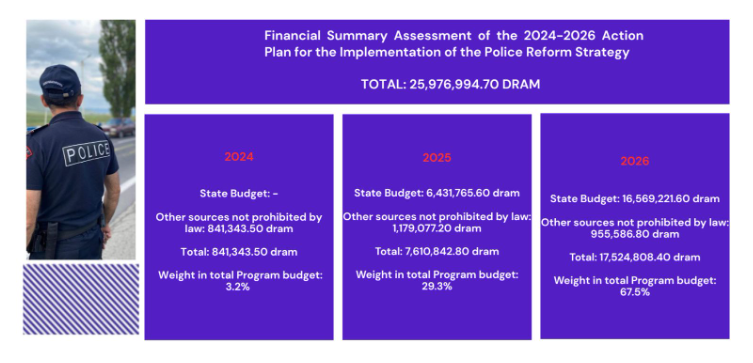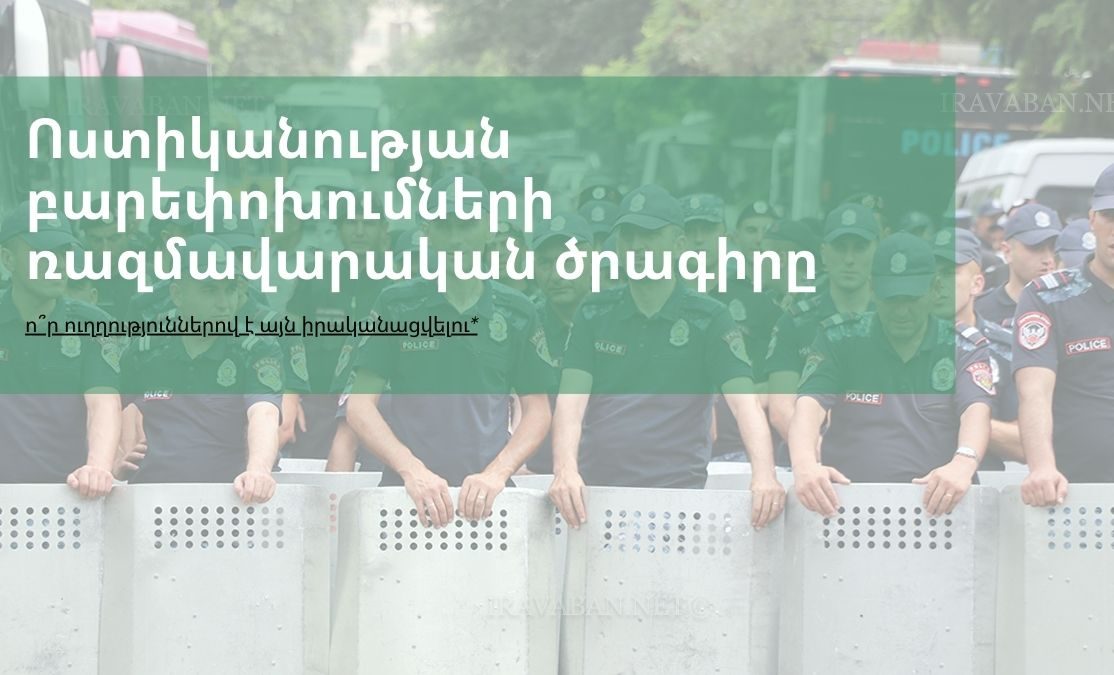Last year, the Government adopted the Strategic Program for Police Reforms and the resulting 2024-2026 Action Plan.
According to Iravaban.net, the approval of the strategy has outlined the priorities in the field, the main developments, with the establishment of responsible bodies, deadlines, and measurable and clear verification results
As reported by the Ministry of Internal Affairs, the development of the strategy was based on previous achievements of the police sector reform strategy, lessons learned, results of independent expert assessment, and extensive focus group discussions were held with representatives of civil society and youth to ensure broad public consensus around the draft.
The necessity of the 2024-2026 reform cycle is conditioned by the following objectives: establishment of the Ministry of Internal Affairs, improvement of service quality, strengthening of institutional connection between the ministry and the police, finalization of the police management scheme and functionality, introduction of a new institutional approach to human resource management in the police.
The strategic program addresses the following key directions, in particular, the final view of the police structure and functionality will be ensured, an updated description for jobs will be defined, and so on.
The human resource management of the Ministry of Internal Affairs will undergo profound transformation, increasing the attractiveness of service in the police, promoting the involvement of women, strengthening integrity, and managing corruption risks. The educational environment will be reformed, within which a unified educational complex of the Ministry of Internal Affairs will be formed, a single unified channel for entering the police system will be introduced, and continuous education of personnel will be guaranteed.
The creation of one unified national operational management center, 112, is planned, within which the service of calls to separate phone numbers 911, 102, 103 will be discontinued, and citizens will receive service for their calls through one phone number, from one point, with quick service, which is planned to be implemented in 2026.
This strategy also defines the creation of the police guard.
There are 14 main directions indicated that need to be improved:
1) Changes in the organizational-legal form of the Police with the formation of the Ministry of Internal Affairs, the management model and functional development
2) Effective human resource management and strengthening integrity
3) Improvement of the educational environment, Police personnel training, professional development
4) Development of patrol service as a new and modern model of external service
5) Creation of a unified national operational management center (112)
6) Development of criminal police, effectiveness of operational work
7) Reimagining community policing
8) Transformation of police troops, formation of Police Guard
9) Sensitive issues of human rights protection
10) Inclusiveness of reforms implementation, monitoring and coordination of actions
11) Public perception, strategic communication
12) International cooperation within the framework of police reforms
13) Risks of strategy implementation and their addressing
14) Financial summary assessment of the strategy.
The financial summary assessment of the 2024-2026 Action Plan for the Police Reform Strategy Implementation by funding sources and years is as follows:

The “Public Control and Awareness of Effective and Inclusive Police Reforms” sub-grant is implemented by the “Armenian Lawyers Association” through the “Monitoring of Justice Sector Reforms in Armenia” (https://juremonia.am/en/) program funded by the European Union, within the framework of a grant announced by the “Social Justice” non-governmental organization.
The overall objective of the program is to increase civil society participation in monitoring police reforms and assessing impact by providing structural engagement mechanisms, independent assessment, and raising public awareness. Close cooperation and involvement with non-governmental organizations, as well as the relevant subdivisions of the Ministry of Internal Affairs, are planned during the implementation of the program.
This article was prepared with the financial support of the European Union. The “Armenian Lawyers Association” non-governmental organization is responsible for the content, and it does not necessarily express the views of the European Union.















